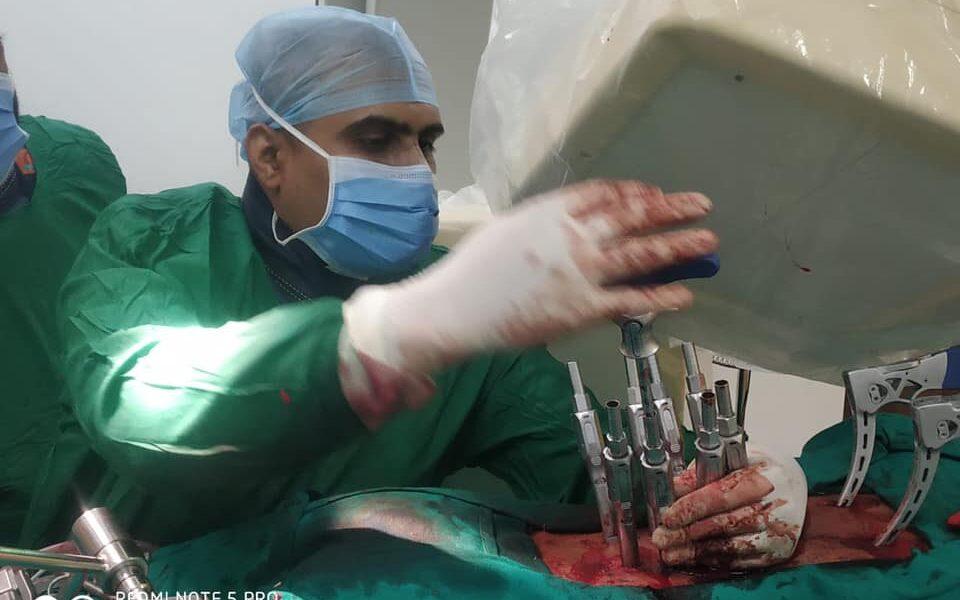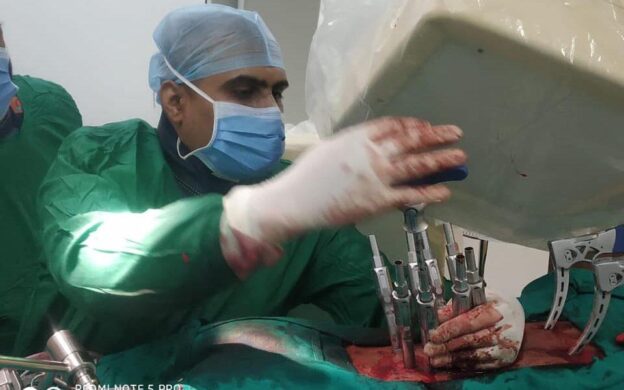Neurosurgery for Spinal Disorders: the diagnosis and treatment of spinal disorders such as herniated discs, spinal stenosis, and degenerative disc disease
Introduction
The spine is an essential part of the human body, responsible for supporting the weight of the upper body and protecting the spinal cord. Spinal disorders are a common problem that can cause severe pain, disability, and reduced quality of life. They can arise due to various reasons such as herniated discs, spinal stenosis, and degenerative disc disease. Neurosurgery is a specialty that deals with the diagnosis and treatment of spinal disorders. In this blog, we will discuss the diagnosis and treatment of spinal disorders, including herniated discs, spinal stenosis, and degenerative disc disease.
Herniated Discs
A herniated disc is a condition that occurs when the soft center of a spinal disc pushes through a crack in the outer layer, irritating nearby nerves and causing pain, weakness, or numbness in the back, neck, arms, or legs. Herniated discs can be caused by age-related wear and tear, repetitive stress, lifting heavy objects, or a sudden injury.
Diagnosis
To diagnose a herniated disc, a doctor will begin by conducting a physical exam and taking a medical history. They may also use imaging tests such as X-rays, magnetic resonance imaging (MRI), or computerized tomography (CT) scans to get a better look at the spine and determine the extent of the herniation.
Treatment
The treatment of herniated discs depends on the severity of the condition. In mild cases, rest, physical therapy, and pain relievers may be enough to relieve symptoms. In more severe cases, surgery may be required to remove the herniated portion of the disc.
One common surgical procedure used to treat herniated discs is called a discectomy. During a discectomy, the surgeon removes the herniated portion of the disc to relieve pressure on the nerve. In some cases, the surgeon may also need to remove a portion of the bone to create more space for the nerve.
Spinal Stenosis
Spinal stenosis is a condition that occurs when the spaces within the spine narrow, putting pressure on the nerves that run through the spine. It can cause symptoms such as back pain, numbness, tingling, and weakness in the legs. Spinal stenosis is usually caused by age-related wear and tear, but it can also be caused by conditions such as arthritis, scoliosis, or a herniated disc.
Diagnosis
To diagnose spinal stenosis, a doctor will conduct a physical exam and take a medical history. They may also use imaging tests such as X-rays, MRI, or CT scans to get a better look at the spine and determine the extent of the stenosis.
Treatment
The treatment of spinal stenosis depends on the severity of the condition. In mild cases, rest, physical therapy, and pain relievers may be enough to relieve symptoms. In more severe cases, surgery may be required to relieve pressure on the nerves.
One common surgical procedure used to treat spinal stenosis is called a laminectomy. During a laminectomy, the surgeon removes a portion of the bone to create more space for the nerves. The surgeon may also need to remove a portion of the herniated disc or bone spurs that are causing the stenosis.
Degenerative Disc Disease
Degenerative disc disease is a condition that occurs when the discs between the vertebrae in the spine begin to break down and lose their cushioning ability. It can cause symptoms such as back pain, neck pain, and stiffness. Degenerative disc disease is usually caused by age-related wear and tear, but it can also be caused by repetitive stress or a sudden injury.
Diagnosis
To diagnose degenerative disc disease, a doctor will conduct a physical exam and take a medical history. They may also use imaging tests such as
MRI or X-rays to get a better look at the spine and determine the extent of the degeneration.
Treatment
The treatment of degenerative disc disease depends on the severity of the condition. In mild cases, rest, physical therapy, and pain relievers may be enough to relieve symptoms. In more severe cases, surgery may be required to address the underlying problem.
One common surgical procedure used to treat degenerative disc disease is called spinal fusion. During spinal fusion, the surgeon joins two or more vertebrae together, eliminating the motion between them. This can help relieve pain by stabilizing the spine and preventing further degeneration.
Another surgical option is artificial disc replacement, which involves removing the damaged disc and replacing it with an artificial one. This procedure aims to preserve motion in the spine and reduce the risk of adjacent segment disease, which can occur after spinal fusion.
Conclusion
Spinal disorders can cause significant pain and disability, affecting a person’s quality of life. However, with the advances in neurosurgical techniques, many spinal disorders can be successfully treated. If you are experiencing symptoms of a spinal disorder, such as back pain, numbness, tingling, or weakness, it is important to seek medical attention promptly.
A neurosurgeon can help determine the underlying cause of your symptoms and recommend an appropriate treatment plan. While surgery may be necessary in some cases, many spinal disorders can be treated without surgery through a combination of rest, physical therapy, and pain management techniques.
It is also essential to take steps to prevent spinal disorders, such as maintaining good posture, exercising regularly, avoiding repetitive stress, and lifting heavy objects correctly. By taking these steps and seeking prompt medical attention when needed, you can help keep your spine healthy and avoid the debilitating effects of spinal disorders.
If you or a loved one is experiencing symptoms of a spinal disorder, it is important to seek care from a reputable medical center with experienced neurosurgeons. One such hospital is Dr. Rao’s Hospital for Neuro and Spine Surgery, which is renowned for its expertise in minimally invasive spine surgeries. Dr. Rao’s Hospital utilizes advanced technologies and techniques to provide patients with the best possible outcomes while minimizing risks and reducing recovery times. The hospital’s highly skilled team of neurosurgeons, nurses, and support staff is committed to providing personalized care to each patient and their families. If you are seeking expert care for a spinal disorder, Dr. Rao’s Hospital is an excellent choice.
#spinaldisorders #neurosurgery #minimallyinvasive #spinesurgery #degenerativediscdisease #herniateddiscs #spinalstenosis #backpainrelief #DrRao’sHospital #patientcare #healthylifestyle


